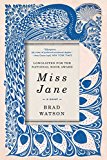Summary | Excerpt | Reviews | Beyond the Book | Readalikes | Genres & Themes | Author Bio

Excerpt
Miss Jane
You would not think someone so afflicted would or could be cheerful, not prone to melancholy or the miseries. Early on she acquired ways of dealing with her life, with life in general. And as she grew older it became evident that she feared almost nothing—perhaps only horses and something she couldn't quite name, a strange presence of danger not quite or not really a part of the world.
She didn't fear a fever of the kind that had taken brother William at the age of three, before she was born. To her mind such fate belonged to that child, not her.
She wasn't afraid of snakes, not even the poisonous kind, for she believed they wouldn't bite her if she simply left them alone. Mosquitoes, for some reason of their own, did not bite her, although she took no precautions against them.
She did not fear chickens, because she found them to be comically sage—in spite of what people said about stupid chickens. The same with pigs, although their frequent, abrupt, chaotic, or oddly orchestrated and deafening panic at first frightened her, until she saw the comical in that. The panic was sudden in its arrival and departure, both. Cows were so obviously a threat to no one, if you did not threaten a mother's calf. The bull was safely penned in his separate small pasture.
She didn't fear the coyotes that sang at night in the open fields, nor the panthers that sometimes screamed far off deep in the woods. She loved to kneel at the open window and listen to the coyotes sing and imagine what they were singing to each other, what their singing meant to them. She did not mind them tearing mice, rabbits, and squirrels to pieces, nor running down newborn fawns. Nor the panthers sometimes taking a newborn calf. Her odd fear of an unnamed beast, something we might call mythical, came from having thought she once heard one grumbling near the house at night, and she was terrified then.
She was not afraid of screeching owls in the night, nor of the possibility of coming upon wild hogs during her walks in the woods, nor packs of wild dogs that sometimes roamed the pastures and were to everyone more fearsome than the coyotes or panthers or bears, their having no fear of man. She was not afraid of rabid coons or foxes, of her father's guns, being a ten-gauge shotgun and a Winchester rifle. Nor of the hatchet used to decapitate the chickens, nor the long knives used to butcher the hogs, nor the smaller knives used to skin and butcher the occasional deer, nor the saws used for sawing their bones. Nor the large black kettle, used to boil water for washing soiled clothes and also for making soap in the yard, that she was told to stay clear of when she was small. Nor was she afraid of hell, although the preachers on the circuit warned of it, but she was not afraid of eternal fire or demons and the devil himself. She could not properly conjure them in her mind without a comical air. Jane, who rarely even went to town as a child, could not imagine going to hell, her imagination being neither successfully cross-country nor subterranean.
She was not afraid of cyclones in the darkest bile-green-and-black skies during storms that cracked off the limbs of oaks and the tops of pines and made the tin roof of the house and gallery pop and groan and bend upward at the edges. Nor of the hail that pocked the tin like buckshot raining down. Nor of lightning that split trees their length and left smoldering charred skeletons rooted to the wet, scorched earth. She was not afraid of God, with his sly and untrustworthy balance of love and wrath, who was yet curious enough to make himself vulnerable and walk among humans just like herself in the beautiful, harrowing embodiment of Jesus.
She feared horses because when they yanked their heads skyward and rolled their eyes she imagined they knew better than her what there was to fear in the air, in the inescapable physical world. She did not fear mules, which her father explained were smarter than horses and predictable, and later she liked it when she learned that they had no lineage. When she was small she feared standing bodies of water because for some reason she thought they were bottomless, but her father cured her of that by taking her fishing at their pond and coaxing her to wade in, cool off, feel the muddy earth safely there beneath the surface. Still, she would never learn to swim.
Excerpted from MISS JANE: A Novel by Brad Watson. Copyright © 2016 by Brad Watson. With permission of the publisher, W. W. Norton & Company, Inc. All rights reserved.




It is always darkest just before the day dawneth
Click Here to find out who said this, as well as discovering other famous literary quotes!
Your guide toexceptional books
BookBrowse seeks out and recommends the best in contemporary fiction and nonfiction—books that not only engage and entertain but also deepen our understanding of ourselves and the world around us.